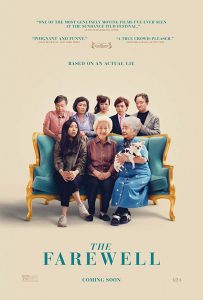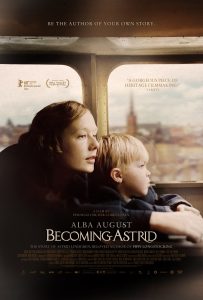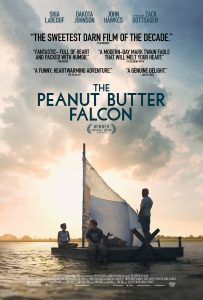







“The Peanut Butter Falcon” (2019). Cast: Shia LaBeouf, Dakota Johnson, Zack Gottsagen, John Hawkes, Bruce Dern, Thomas Haden Church, Jon Bernthal, Yelawolf, Jake “The Snake” Roberts, Mick Foley, Wayne DeHart, Bruce Henderson. Directors: Tyler Nilson and Mike Schwartz. Screenplay: Tyler Nilson and Mike Schwartz. Web site. Trailer.
How many of us are living truly fulfilled lives? Do we approach our existence with all-out gusto and a willingness to pursue our dreams? Or are we restricted by rules, regulations, fears and regrets – many of our own making – that keep us from fulfilling our potential? Sometimes it takes breaking out of rigid, ingrained patterns of thought and behavior that prevent us from getting the most out of our time in this reality. Such are the themes that underlie the story line of the charming new comedy-drama-road trip movie, “The Peanut Butter Falcon.”
Have you ever been in a situation where there was something you wanted to do but were prevented from doing so by those who thought you were incapable? That’s the problem faced by Zak (Zack Gottsagen), a 22-year-old affected by Down syndrome. Having been abandoned by his family, Zak became a ward of the state. But, given the lack of adequate residential facilities for individuals with his condition in his eastern North Carolina community, he’s been forced to live in a senior citizens’ home. And he hates it. As the only resident in his age range and with his condition, he feels isolated. He wants out.
[caption id="attachment_10938" align="aligncenter" width="300"] Eager to pursue his dream of becoming a professional wrestler, Zak (Zack Gottsagen) escapes from his residential care facility to attend a school run by his idol, the Salt Water Redneck, to learn how to become a grappler, as seen in “The Peanut Butter Falcon.” Photo by Nigel Bluck, courtesy of Roadside Attractions and Armory Films.[/caption]
Eager to pursue his dream of becoming a professional wrestler, Zak (Zack Gottsagen) escapes from his residential care facility to attend a school run by his idol, the Salt Water Redneck, to learn how to become a grappler, as seen in “The Peanut Butter Falcon.” Photo by Nigel Bluck, courtesy of Roadside Attractions and Armory Films.[/caption]
Zak has a plan, too. As a huge fan of professional wrestling, he dreams of escaping to enroll in a school run by his idol, Salt Water Redneck (Thomas Haden Church), to learn how to become a grappler. His enthusiasm for the sport is obvious, and physically he’s certainly strong enough for it. All he needs to do is figure out a way to get out.
After a failed escape attempt, Zak is labeled a flight risk by his case worker, Eleanor (Dakota Johnson). She realizes he’s unhappy, and she’s doing everything she believes she can to make his life as satisfying as possible. Even with that, though, she has bars placed on his windows to prevent a repeat episode. However, given Zak’s desire to pursue his dream, he vows to escape, and, with the assistance of his elderly roommate, Carl (Bruce Dern), the would-be wrestler finds a way to get out, fleeing in the middle of the night. When Eleanor learns of his getaway, she goes in pursuit of the escapee, but finding the clever fugitive proves to be easier said than done.
After hours on the run, Zak comes upon a fishing boat harbor. Tired and in need of sleep, he takes refuge under a tarp on one of the boats. But that rest is soon interrupted when trouble arises for the boat’s skipper, Tyler (Shia LaBeouf), a rogue crab fisherman who’s been poaching catches from waters claimed by a licensed but vindictive peer, Duncan (John Hawkes). After setting fire to Duncan’s gear in response to strong-arm threats, Tyler looks to make a hasty getaway from the harbor to avoid the retribution of Duncan and his chief muscle, Ratboy (Yelawolf). He jumps into his boat to take off, unaware that he has an unwitting passenger onboard.
[caption id="attachment_10939" align="aligncenter" width="300"] Unlikely road trip companions, wrestling wannabe Zak (Zak Gottsagen, left) and rogue fisherman Tyler (Shia LaBeouf, right) set off on an adventure with others in hot pursuit in the charming new comedy-drama, “The Peanut Butter Falcon.” Photo by Seth Johnson, courtesy of Roadside Attractions and Armory Films.[/caption]
Unlikely road trip companions, wrestling wannabe Zak (Zak Gottsagen, left) and rogue fisherman Tyler (Shia LaBeouf, right) set off on an adventure with others in hot pursuit in the charming new comedy-drama, “The Peanut Butter Falcon.” Photo by Seth Johnson, courtesy of Roadside Attractions and Armory Films.[/caption]
A high-speed boat chase ensues, but Tyler manages to escape detection by successfully hiding in a patch of tall aquatic reeds. It’s only then that he discovers Zak. Tyler’s not entirely sure what to do, but, realizing that Zak needs help, he quickly, albeit somewhat reluctantly, finds himself developing a sense of responsibility for his young companion.
Responsibility is something that Tyler has never taken to readily. For example, his recent poaching activity illustrates his limitations in this area. But, more than that, he deeply regrets how his lack of this attribute contributed to the death of someone near and dear to him. Helping Zak find his way to wrestling school, then, just might help him to make up for some of these past oversights.
And so, with their destination of the Salt Water Redneck School of Wrestling in mind, the unlikely duo sets off on a quirky, eventful road trip. Along the way, Tyler and Zak have a number of memorable experiences, such as nearly being overrun by an enormous shrimp boat, encountering a blind, aging evangelist (Wayne DeHart) hell-bent on baptizing them, and sailing aboard a makeshift raft. Tyler also provides Zak with some impromptu training as a wrestler, both physically and attitudinally, including the adoption of his ring name: the Peanut Butter Falcon.
The road trip is not without its challenges, though. Both Tyler and Zak are hotly pursued by others (i.e., Duncan, Ratboy and Eleanor), and they clearly don’t have much patience for the vagabonds’ antics. But, through it all, the duo considers their journey an adventure, one that’s akin to a modern-day version of Mark Twain’s Huckleberry Finn. The question is, though, will they reach their destination? And, if so, will it live up to their expectations? For those driven by their dreams, there’s no telling what’s possible.
[caption id="attachment_10940" align="aligncenter" width="300"] Runaway Zak (Zack Gottsagen, left), case worker Eleanor (Dakota Johnson, center) and renegade crab fisherman Tyler (Shia LaBeouf, right) find life on the road together thrilling but challenging in “The Peanut Butter Falcon.” Photo by Seth Johnson, courtesy of Roadside Attractions and Armory Films.[/caption]
Runaway Zak (Zack Gottsagen, left), case worker Eleanor (Dakota Johnson, center) and renegade crab fisherman Tyler (Shia LaBeouf, right) find life on the road together thrilling but challenging in “The Peanut Butter Falcon.” Photo by Seth Johnson, courtesy of Roadside Attractions and Armory Films.[/caption]
Those dreams, of course, are largely made possible by our beliefs – beliefs in what we would like to achieve but, more importantly, in what we consider attainable. The trick, though, is figuring out how to formulate the beliefs required to bring those ideas into being. Those are the cornerstone principles underlying the conscious creation process, the philosophy that maintains we draw upon the power of those metaphysical building blocks in manifesting the reality we experience.
A key starting point in this process is developing beliefs where we’re able to envision the desired outcome. As metaphysical author and teacher Gregg Braden has often observed, an effective way of accomplishing this is by picturing the end result as if it’s already happened. In that way, the notion takes on greater weight, an undeniable “density” that helps to root it in our minds and in the line of possible existence we would like to pursue. And that places us one step closer to the outcome’s realization.
In this story, Zak is so sold on becoming a professional wrestler that coming up with beliefs and plans to see it happen are almost second nature, and that makes its materialization that much more likely. He thus serves as a powerful influence to those around him, most notably those in need of getting their acts together and their lives on track. Tyler most readily comes to mind here, given that he appears to have been aimlessly drifting for some time. But, in her own way, this also applies to Eleanor, someone who appears to have more gifts to offer others than merely serving as a mid-level administrator in a nursing home. While there may be nothing inherently wrong with that, it seems that it’s below her capabilities and potential. Perhaps Zak can inspire both of them to find their callings by helping instill in them the ability to envision their future in the same affirmed way he does.
[caption id="attachment_10941" align="aligncenter" width="300"] Angry fisherman Duncan (John Hawkes) seeks retribution against a poacher of his catches in the quirky new comedy-drama, “The Peanut Butter Falcon.” Photo by Nigel Bluck, courtesy of Roadside Attractions and Armory Films.[/caption]
Angry fisherman Duncan (John Hawkes) seeks retribution against a poacher of his catches in the quirky new comedy-drama, “The Peanut Butter Falcon.” Photo by Nigel Bluck, courtesy of Roadside Attractions and Armory Films.[/caption]
Zak is able to accomplish this in large part by not letting limitations hold him back. He doesn’t see his condition as a disability; it’s merely who he is, something he has to work with, but it’s by no means something that intrinsically deters him from following his dreams. In that regard, he’s not only an inspiration to his fellow travelers, but also to anyone who all too easily allows personal crutches from getting in the way of living our lives. And that’s important to recognize, since such notions are beliefs (and self-fulfilling ones at that), not unlike the intents we employ when we seek to manifest anything that’s part of our existence.
In essence, such an attitude reflects the concept of living heroically, moving past our fears and apprehensions to see our aspirations come into being. Again, Zak is an inspiration in this regard, refusing to allow those elements to get in his way, be it an approaching shrimp boat, a vindictive crabber pursuing him and his travelling companion, or a social welfare system seeking to hem him in and keep him from what he wants out of life. That’s powerful stuff, again, not only for those close to him, but also to anyone who’s approaching life timidly and needs to break out of that pattern.
A key component of such an outlook is to learn the power of redemption. The guilt we often experience in the wake of tragedies and disappointments can linger, in large part because it, too, is a belief, one that can become all too easily entrenched. Consequently, we may become stuck in our own thoughts, unable to move forward. But, as conscious creation maintains, we have an infinite range of possibilities for existence available to us at any given time, meaning that our realities can indeed be changed. And those changes, like anything else we create, depend on the beliefs we maintain, including those that allow us to atone for our past, to redeem ourselves for the future that lies ahead of us.
[caption id="attachment_10942" align="aligncenter" width="300"]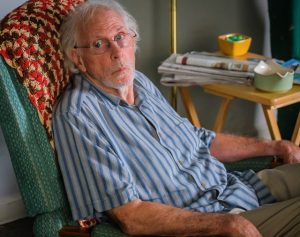 Wily senior citizens’ home resident Carl (Bruce Dern) helps his roommate escape to pursue his dream in “The Peanut Butter Falcon.” Photo by Joe Mast, courtesy of Roadside Attractions and Armory Films.[/caption]
Wily senior citizens’ home resident Carl (Bruce Dern) helps his roommate escape to pursue his dream in “The Peanut Butter Falcon.” Photo by Joe Mast, courtesy of Roadside Attractions and Armory Films.[/caption]
Many of us may find this difficult, but it’s far from impossible to overcome. This is where the power of forgiveness comes into play. In particular, this involves the forgiveness we show ourselves in the wake of situations that prompted the aforementioned guilt. By envisioning, forming and embracing beliefs that make this possible, we can move into a state of forgiveness, one where we let ourselves off the hook for what may have happened, thereby removing the emotional baggage that makes it easier for us to begin the process of getting on with our lives.
Redemption is something Tyler obviously needs to pursue; his guilt and his failure to forgive himself have kept him stuck in a huge rut for a long time. But, in her own way, Eleanor needs to do the same; while she wasn’t personally responsible for a tragedy of her own, she’s apparently been touched by it in a way that has kept her from fully pursuing the happiness she deserves, a redemptive change she’d be wise to give herself permission to experience.
To achieve this, Tyler and Eleanor should yet again look to Zak for guidance. He was no doubt upset that he was abandoned by his family. And he truly dislikes being called “retard” by disparaging strangers. But he refuses to allow such things to characterize him; he’s not his condition, nor is he defined by everything that has come along with it. These are circumstances he deals with in the process of redeeming himself to become the person he wants to be, a lesson we’d all be wise to follow if we hope to get the most out of life. Zak certainly does.
[caption id="attachment_10943" align="aligncenter" width="300"] Like characters out of a modern-day Huckleberry Finn, mismatched traveling companions Eleanor (Dakota Johnson, left), Zak (Zack Gottsagen, center) and Tyler (Shia LaBeouf, right) set off on a grand adventure in “The Peanut Butter Falcon.” Photo by Nigel Bluck, courtesy of Roadside Attractions and Armory Films.[/caption]
Like characters out of a modern-day Huckleberry Finn, mismatched traveling companions Eleanor (Dakota Johnson, left), Zak (Zack Gottsagen, center) and Tyler (Shia LaBeouf, right) set off on a grand adventure in “The Peanut Butter Falcon.” Photo by Nigel Bluck, courtesy of Roadside Attractions and Armory Films.[/caption]
Despite some occasionally sluggish pacing and a narrative that’s more than a little predictable, “The Peanut Butter Falcon” is one of the sweetest, most heartfelt feel good comedy-drama-road trip offerings to come along in years. LaBeouf and Johnson turn in some of their best work here, but newcomer Gottsagen is the real stand-out, a natural on screen who charms and surprises at seemingly every turn. This may not be epic cinema, but it’s certainly satisfying, well-crafted, crowd-pleasing entertainment, the kind of endearing story we could certainly use more of these days.
If we’re unsatisfied by the world around us, we should seek to alter it. As Mohatma Gandhi famously observed, “You must be the change you wish to see in the world.” That’s good advice, and we should draw from inspirations that embody it, no matter what source they come from. Zak provides us with a good example to follow, both in the wrestling ring and on the playing field of life.
Copyright © 2019, by Brent Marchant. All rights reserved.
“Where’d You Go, Bernadette” (2019). Cast: Cate Blanchett, Billy Crudup, Emma Nelson, Kristin Wiig, Laurence Fishburne, Judy Greer, Troian Bellisario, Zoe Chao, Megan Mullally, Steve Zahn, David Paymer, James Urbaniak, Kate Burton. Director: Richard Linklater. Screenplay: Richard Linklater, Holly Gent and Vince Palmo. Book: Maria Semple, Where’d You Go, Bernadette. Web site. Trailer.
Some of us just have to create. The compulsion is so strong that we can’t ignore it, as if it’s an itch that must be scratched. And, if that need goes unfulfilled, it can drive us crazy – literally. So it is for an exceptionally talented woman on the brink in the offbeat new comedy-drama, “Where’d You Go, Bernadette.”
Bernadette Fox (Cate Blanchett) leads a rather unusual life. The eccentric middle-aged Seattle wife and mother spends most of her time tending to her family, husband Elgie (Billy Crudup), a high-level Microsoft engineer, and teenage daughter Bee (Emma Nelson), an intelligent, multi-talented adolescent. Bee is so gifted, in fact, that her excellent grades all throughout middle school earned her a reward of her choice, a promise made to her by her parents. And, as the ambitious, adventurous sort that she is, Bee chose big: a family vacation to Antarctica.
[caption id="attachment_10929" align="aligncenter" width="300"] Reclusive Seattle housewife Bernadette Fox (Cate Blanchett) hides out from others – and herself – in the offbeat new comedy-drama, “Where’d You Go, Bernadette.” Photo courtesy of Annapurna Pictures.[/caption]
Reclusive Seattle housewife Bernadette Fox (Cate Blanchett) hides out from others – and herself – in the offbeat new comedy-drama, “Where’d You Go, Bernadette.” Photo courtesy of Annapurna Pictures.[/caption]
Bee’s choice, needless to say, comes as something of a surprise, more than what her parents expected. The prospect is especially daunting for Bernadette, given that she’s something of a neurotic recluse. She suffers from severe insomnia and is noticeably uncomfortable around people other than her family. She particularly cringes when having to deal with her nosy, persnickety neighbor, Audrey (Kristin Wiig), who’s managed to elevate political correctness to an art form. Because of these issues, Bernadette seldom leaves home. She doesn’t work (even though she once did as a brilliant, innovative architect), instead devoting much of her time and attention to the renovation of the family’s vintage manor house, a project that sometimes seems more trouble than it’s worth. And now that she’s facing the possibility of having to travel far outside of her comfort zone to a strange land on an excursion where she’ll be among throngs of strangers, she’s more high strung than ever. She doesn’t want to disappoint Bee, but she’s far from certain that she’ll be able to comply with her daughter’s wishes.
As Bernadette attempts to prepare for the trip, her behavior becomes even more unpredictable. She’s accused of being responsible for inflicting injury to Audrey and causing extensive damage to her property. She’s suspected of seeking to acquire dangerous prescription drugs through her physician, strong medication that she claims she needs to help her cope with the extreme sea sickness she anticipates suffering aboard the ship she’ll be taking to Antarctica. And she becomes embroiled in an FBI investigation involving foreign hackers who’ve infiltrated her virtual assistant in an attempt to steal her identity. What’s going on here?
Elgie is naturally concerned, so much so that he believes it’s time for an intervention with a psychiatrist, Dr. Kurtz (Judy Greer). The duo thinks it may be time for Bernadette to check herself into a mental health facility to find out what’s really going on. And, as her story unfolds, there are hints as to what might be wrong. But will Bernadette cooperate in this effort? She initially seems reluctantly willing to go along with the recommendation – that is, until she makes a hasty exit out of a bathroom window, disappearing into the outside world, not to be seen, prompting everyone to ask the question that gives this film its title.
[caption id="attachment_10930" align="aligncenter" width="300"] Doting mother Bernadette (Cate Blanchett, left) and multi-talented daughter Bee (Emma Nelson, right) share a special bond in director Richard Linklater’s latest, “Where’d You Go, Bernadette.” Photo by Wilson Webb, courtesy of Annapurna Pictures.[/caption]
Doting mother Bernadette (Cate Blanchett, left) and multi-talented daughter Bee (Emma Nelson, right) share a special bond in director Richard Linklater’s latest, “Where’d You Go, Bernadette.” Photo by Wilson Webb, courtesy of Annapurna Pictures.[/caption]
Bernadette’s bizarre behavior poses a major puzzle to those who care about her. Those who have known her for a long time are truly baffled. They can’t help but ask, “How did someone who once had it all together slip into such a state of personal disarray?” What’s more, given that it appears matters are only getting worse, worried onlookers can’t help but wonder where things will go from here.
To unravel this situation, everyone involved – most notably Bernadette herself – must determine the elements driving such strange conduct. And a good starting point for this is a thorough examination of her beliefs, the foundation of the conscious creation process, the philosophy that maintains we draw upon these tools for manifesting the reality we experience. Clearly, though, she has her work cut out for herself.
A key word in undertaking this analysis is “creation.” What does it mean to her? Many would argue that, given Bernadette’s life of late, she’s not really creating very much. To be sure, she has cultivated a strong relationship with Bee, whom she positively adores. But, beyond that, what does she have to show for her time and effort?
That lack of creative output is surprising, too, given Bernadette’s background. Twenty years earlier when she was living in Los Angeles, Bernadette was a legendary architect, having come up with inventive designs not only for her structures, but also for many of their internal elements, such as inspired furniture creations. She became one of the leading women in her field, even capturing a prestigious MacArthur Grant. She was sought after for her revolutionary thinking, daring to design and construct buildings that no one else could even begin to envision.
[caption id="attachment_10931" align="aligncenter" width="300"]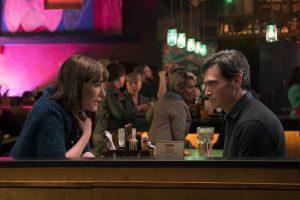 The eccentric behavior of housewife and mother Bernadette Fox (Cate Blanchett, left) causes concern for her loving husband, Elgie (Billy Crudup, right) in the quirky new comedy-drama, “Where’d You Go, Bernadette.” Photo by Wilson Webb, courtesy of Annapurna Pictures.[/caption]
The eccentric behavior of housewife and mother Bernadette Fox (Cate Blanchett, left) causes concern for her loving husband, Elgie (Billy Crudup, right) in the quirky new comedy-drama, “Where’d You Go, Bernadette.” Photo by Wilson Webb, courtesy of Annapurna Pictures.[/caption]
All of this comes out through an obscure but revealing online video about her career, as well as a lengthy chance conversation with one of her former architecture associates, Paul Jellinek (Laurence Fishburne). But, despite her impressive track record, all of a sudden, she mysteriously dropped out of sight. She abandoned her career, attempting nothing more noteworthy than the renovation of the family residence, an uphill battle for which maintaining her enthusiasm is often quite a challenge. Why did she drop out of sight?
To say more would reveal too much. However, suffice it to say that, considering Bernadette’s boundless capacity for creativity, there can be tremendous consequences when a talent like that becomes stifled. And, as becomes apparent, that suppression stems directly from events of her past and the beliefs that stemmed from them, most notably a lack of desire to create in the face of plans going awry or becoming distorted. When this happens, it becomes all too easy to embrace the belief “Why bother?” At the same time, though, when one’s creative impulse is curtailed, even when seemingly undercut by countervailing futility-based beliefs, it nevertheless seeks to become unleashed, like a wild mustang seeking to break out of a holding pen.
That’s where Bernadette is at, and it’s a belief conundrum that impacts her creation efforts in all areas of her life, not just in her talents as an architect. But her inability to see and grasp this problem, as well as her blindness to finding an effective solution, have her stuck in place and quickly sinking into a morass of frustration of her own making. When a creative sort wants to create and can’t, fewer situations are more maddening. If Bernadette hopes to get her life back on track, not to mention save her sanity, she’ll need to clearly see these circumstances for what they are – and find a way to fix them.
[caption id="attachment_10932" align="aligncenter" width="300"] Nosy neighbor Audrey (Kristin Wiig, left) and her condescending partner-in-crime, Soo-Lin (Zoe Chao, right), routinely irk a neurotic recluse in the new comedy-drama, “Where’d You Go, Bernadette.” Photo by Wilson Webb, courtesy of Annapurna Pictures.[/caption]
Nosy neighbor Audrey (Kristin Wiig, left) and her condescending partner-in-crime, Soo-Lin (Zoe Chao, right), routinely irk a neurotic recluse in the new comedy-drama, “Where’d You Go, Bernadette.” Photo by Wilson Webb, courtesy of Annapurna Pictures.[/caption]
Should she do this, however, the results can be miraculous. Recharging our creative batteries by implementing beliefs that enable this can produce powerfully rejuvenating outcomes, not only in the tangible manifestations they yield, but also in the outlook of the creator. Such an effort can wipe away the frustration that blocks our creative output while restoring stability to our overall thought processes, especially when it comes to forming and understanding our materialization beliefs and our prevailing general outlook. Imagine what such a change could do for someone like Bernadette.
The importance of all this goes beyond just coming up with pretty things to look at. It can also have significant impact on one’s overarching psychological health, particularly for those who are meant to create. For some individuals, like Bernadette, creativity is their calling, their destiny, their value fulfillment (as conscious creators call it). But, when such impulses become chronically obstructed, the result can be more than just a temporary case of artist’s block; it can become something more debilitating, a condition that far-reaching ramifications not unlike those seen in this story. To avoid that, we had better make sure we keep the creativity flowing – and as abundantly as possible.
[caption id="attachment_10933" align="aligncenter" width="300"] A stroll down memory lane between former architect Bernadette Fox (Cate Blanchett, right) and onetime colleague Paul Jellinek (Laurence Fishburne, left) stirs up some fond recollections and more than a few ghosts of the past as seen in “Where’d You Go, Bernadette.” Photo courtesy of Annapurna Pictures.[/caption]
A stroll down memory lane between former architect Bernadette Fox (Cate Blanchett, right) and onetime colleague Paul Jellinek (Laurence Fishburne, left) stirs up some fond recollections and more than a few ghosts of the past as seen in “Where’d You Go, Bernadette.” Photo courtesy of Annapurna Pictures.[/caption]
While somewhat ambling in its approach, this offbeat comedy-drama nevertheless delves into a number of profound notions, especially in the areas of creativity and fulfillment and what can happen when they aren’t satisfied. Blanchett and newcomer Nelson deliver fine performances as an outspoken and unusual mother-daughter duo in a quirky tale that’s sporadically overwritten and sometimes verges on losing control of the room. Based on the best-selling novel of the same name, director Richard Linklater’s latest is far from perfect (or even adequately developed for that matter), but it’s certainly not the unmitigated train wreck that some have made it out to be.
Creativity in general (and conscious creation in particular) is like a muscle – the more we use it, the stronger it gets. By contrast, if we fail to draw on it, we can run into a serious case of atrophy, making it especially difficult to get back on track if it falls into disuse. As Bernadette’s experience shows, the consequences of that can be far greater than just not producing one’s latest novel or painting; it can affect our very survival. But, then, if we all essentially live to create, there’d be no survival without it.
Copyright © 2019, by Brent Marchant. All rights reserved.
“Tel Aviv on Fire” (2018 production, 2019 release). Cast: Kais Nashif, Lubna Azabal. Yaniv Biton, Maisa Abd Elhadi, Nadim Sawalha, Salim Dau, Yousef “Joe” Sweid, Amer Hlehel, Laëtitia Eïdo, Ashraf Farah, Ula Tabari, Yaffa Levi. Director: Sameh Zoabi. Screenplay: Dan Kleinman and Sameh Zoabi. Web site. Trailer.
We’ve all experienced situations where the drama meter unfortunately gets turned up way beyond manageable levels. We stand by in shock (and sometimes horror) as events spiral to a fever pitch on their way to careening out of control. In fact, all we need is a Greek chorus to drop in and fan the flames of the emerging spectacle. Woe, oh dreaded woe. But must we really head down that path? Perhaps there are better ways to resolve such matters, a suggestion proposed in the new celluloid satire, “Tel Aviv on Fire.”
Fan loyalty notwithstanding, soap operas are often easy targets for ridicule. Their frequently exaggerated, over-the-top story lines and melodramatic acting regularly draw criticism from those who prefer their entertainment outlets to be “more realistic.” But, given the bona fide, often-overinflated drama of everyday life, with developments that are far more absurd than anything script writers can concoct, these shows may not be as out there as many might think.
So it is with Tel Aviv on Fire, an immensely popular Palestinian soap set during the 1967 Six-day War. The show follows the exploits of Manal (a.k.a. Rachel) (Lubna Azabal), a Palestinian resistance fighter sent undercover to infiltrate Israeli Defense Forces by her lover/colleague, Marwan (Ashraf Farah). Posing as an Israeli assistant to Gen. Yehuda Edelman (Yousef “Joe” Sweid), “Rachel” is charged with seducing the general to gather secret military information and siphon it back to her peers, a task that, when successfully completed, will enable Manal to return to her beloved Marwan to marry and live happily ever after.
At least that’s what’s supposed to happen.
[caption id="attachment_10923" align="aligncenter" width="300"]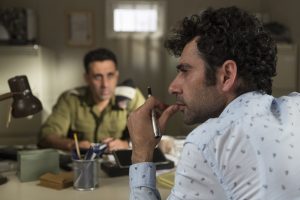 Salam Abbass (Kais Nashif, foreground), production assistant on the Palestinian soap opera Tel Aviv on Fire, inadvertently runs afoul of Israeli security officer Capt. Assi Tzur (Yaniv Biton, background) while at a border checkpoint, necessitating some creative thinking to figure out a way to get back to his home in Jerusalem in the satirical new comedy, “Tel Aviv on Fire.” Photo courtesy of Cohen Media Group.[/caption]
Salam Abbass (Kais Nashif, foreground), production assistant on the Palestinian soap opera Tel Aviv on Fire, inadvertently runs afoul of Israeli security officer Capt. Assi Tzur (Yaniv Biton, background) while at a border checkpoint, necessitating some creative thinking to figure out a way to get back to his home in Jerusalem in the satirical new comedy, “Tel Aviv on Fire.” Photo courtesy of Cohen Media Group.[/caption]
As a Palestinian production, Tel Aviv on Fire is filmed in Ramallah in the West Bank territory, but not everyone who works on the show lives nearby. Tala, for example, the actress who portrays Manal/Rachel, is actually from France, although most of the cast and crew don’t have a commute nearly as long as hers. Some live comparatively closer, such as Salam Abbass (Kais Nashif), a Palestinian production assistant who resides in Jerusalem. Having grown up in Israel, he’s well versed in Hebrew and has been hired by the show’s producer, his Uncle Basam (Nadim Sawalha), to help the actors with their pronunciations, given that Hebrew is not their native tongue.
As part of his daily commuting routine, Salam crosses through the heavily militarized border checkpoint on his way back and forth between Ramallah and Jerusalem. While returning home one day, the docile, subservient, somewhat bumbling amateur linguist makes a statement that a checkpoint guard interprets as potentially threatening. He’s ordered to report to the security officer in charge of the border crossing, Capt. Assi Tzur (Yaniv Biton), an egotistical, self-important military operative who, for what it’s worth, probably has more discretionary authority to handle such situations than he genuinely deserves.
During his interrogation with the captain, Salam mentions that he works on Tel Aviv on Fire, giving himself a promotion from production assistant to staff writer in the process. Assi freely admits his dislike for the show, seeing it as nothing more than anti-Zionist propaganda, but he adds that his wife, Maïsa (Laëtitia Eïdo), like many Israelis, is a big fan. Assi then says that, if Salam could tell him what’s going to happen on the next episode (something that he believes would really impress her), he just might consider letting him go on his merry way. Salam hesitates, realizing that the captain’s request is unreasonable in a number of ways. But Assi asserts that, as a writer for the show, who better than Salam to spill the beans about what’s going to happen next?
Realizing that, if he’s ever to get back home, Salam will have to tell Assi what he wants to hear, a gesture that secures his release – but that will also require the clandestine insertion of some unexpected, anonymously written edits into the script of the next episode. Needless to say, Assi’s prescience about these new story elements impresses Maïsa when the show airs, but it also confounds the Tel Aviv cast and crew, most notably its actual writers, Sarah (Ula Tabari) and Nabil (Amer Hlehel). How did this happen?
However, things don’t end there. As Salam again attempts to cross the border, Assi orders him to make a plot change in which Rachel/Manal falls in love with Yehuda for real, spurning Marwan in the process. What’s more, Assi insists upon the alteration if Salam hopes to be able to make his daily border crossing unimpaired. So, to avoid future commuting hassles, Salam realizes he now must become a writer to carry out his marching orders.
With a stroke of remarkable luck and Tala’s fortuitously timed assistance, Salam successfully lands a writer’s position. He’s relieved that it will enable him to implement Assi’s plot change. He’s also hopeful that this promotion will bolster his image to help him get back on good terms with his ex-girlfriend, Mariam (Maisa Abd Elhadi). But Salam’s optimism is short-lived: His plot revisions run into opposition from his uncle and other members of the crew, placing him squarely between the proverbial rock and hard place. He’s now forced to scramble to meet the needs of both Assi and the Tel Aviv crew, a challenge that only becomes increasingly compounded as he struggles to serve two masters, neither of whom inherently like one another very much.
So how will it turn out? As they say in the TV business, stay tuned for the next exciting episode.
[caption id="attachment_10924" align="aligncenter" width="300"] Tala (Lubna Azabal), a French actress hired to play a Palestinian operative posing as an Israeli military officer’s assistant on a popular soap opera, unwittingly helps a co-worker solve a huge moral dilemma as seen in the satirical new comedy, “Tel Aviv on Fire.” Photo courtesy of Cohen Media Group.[/caption]
Tala (Lubna Azabal), a French actress hired to play a Palestinian operative posing as an Israeli military officer’s assistant on a popular soap opera, unwittingly helps a co-worker solve a huge moral dilemma as seen in the satirical new comedy, “Tel Aviv on Fire.” Photo courtesy of Cohen Media Group.[/caption]
In the world of soaps, things always seem to have a way of working themselves out in the end. But can that happen in real life, too? Well, given that the two are often mirrors of one another, it’s entirely plausible. Why not? After all, in their own respective ways, they’re each milieus backed by their own scripting. When it comes to soaps, the staff writers draft what happens, while in real life, it’s up to each of us, thanks to the conscious creation process, the philosophy that maintains we manifest the reality we experience through the power of our thoughts, beliefs and intents.
As noted earlier, many see the events of soap operas as utterly silly and preposterous, but can’t the same be said about real life? Look at the drama that so many of us put ourselves through, scenarios straight out of any daytime serial. In fact, many would contend that the decades-long political drama that has unfolded between the Israelis and Palestinians is right on par with situations found in the soaps. The stakes may have been higher, but much of the drawn-out drama and many of the manipulative machinations are worthy of almost anything seen in Tel Aviv on Fire.
And that, I believe, is the point of this film – to shine a satirical light on an overwrought situation that has gone on too long with entirely too much unnecessary drama. In some ways, it almost gives viewers an overdue opportunity to exhale, to even suggest to themselves, “Gee, it may actually be OK to laugh at this situation at last.” That, of course, depends in large part on how effectively audiences get the message and are willing to act on it to bring about lasting, meaningful change. And that, as conscious creators know all too well, begins with the beliefs we hold about what we hope to manifest.
In its own way, the film reveals the source of the problem, as well as its solution. In many respects, the characters in both the film and the soap opera within it are determined to see their goals fulfilled at any cost, no matter what consequences may arise: Assi wants to see his plot elements incorporated into the show’s scripts, a program in which its characters are determined to have their objectives met. At the same time, the producers have their agendas, too, some of which may be at odds with the other sought-after goals are in play. In each of these instances, this is the practice of un-conscious creation or creation by default at work, whereby we do whatever it takes with our thoughts, beliefs and intents to materialize what we seek, regardless of whatever fallout may come from our efforts. Unfortunately, such approaches to the materialization process are also often rife with disaster. One need only look at the long and bloody history of the Israeli-Palestinian situation to see this.
The key to resolving such seemingly intractable matters is to break through the belief barriers that hold us back. Getting past the limitations that restrict us and keep us from implementing (or even envisioning) creative solutions is crucial, whether it’s resolving the story line of a soap opera – or ending a war – neither of which may be too far apart from one another, as this film clearly shows.
[caption id="attachment_10925" align="aligncenter" width="300"] Mariam (Maisa Abd Elhadi), ex-girlfriend of a bumbling television production assistant, takes a second look at him when he lands a new job in director Sameh Zoabi’s latest comedic offering, “Tel Aviv on Fire.” Photo courtesy of Cohen Media Group.[/caption]
Mariam (Maisa Abd Elhadi), ex-girlfriend of a bumbling television production assistant, takes a second look at him when he lands a new job in director Sameh Zoabi’s latest comedic offering, “Tel Aviv on Fire.” Photo courtesy of Cohen Media Group.[/caption]
But how do we move past those limitations? That depends in large part on the factors that feed into their establishment, but, as this film shows, it typically involves such issues as relinquishing fears that hold us back, being willing to shed attitudes of control at any cost and other similar impediments. These stumbling blocks frequently interfere with efforts to put new plans in place for a host of new conceptions, but they need only get in the way as long as we allow them to. If we’re willing to take the bold steps of pushing them out of the way, we could well open doors for ourselves that make truly inspiring opportunities possible.
That approach can be seen in the tact that filmmaker Sameh Zoabi took in birthing this picture. By using humor, particularly the kind we often find in fables, the director makes his point by busting an exceedingly overinflated balloon and letting viewers see the completely ludicrous nature of the prevailing situation. By picking on soap operas, he’s able to lampoon a readily available target and take some of the edge off the real world situation, even though closer scrutiny obviously reveals a harder-hitting agenda, one we’d be wise to pay attention to if we hope to avoid repeating the same kinds of mistakes with our thoughts, beliefs, intents, actions and deeds as we move forward.
However, as much as I admire the inventiveness of what “Tel Aviv on Fire” attempts to do, the picture doesn’t quite hit the mark as squarely as it could. Its potentially funny premise, regrettably, doesn’t always rise to the level of that potential. Had it been treated more as a campy screwball romp instead of a comparatively safe satire overloaded with overly talky, quasi-philosophical sequences that water down its narrative, this could have been a much, much better film. The picture’s sometimes-tepid, kid gloves handling of its material not only squanders whatever inherent zaniness it had to work with, but it also unwittingly blunts the impact of the underlying sociopolitical commentary, especially in its satirical punchline. While modestly amusing, this offering unfortunately missed an excellent opportunity to present a refreshingly different, completely irreverent, totally unexpected take on a subject that has typically been addressed with relentlessly serious heavy-handedness – and that might be better for everyone with a little lightening up, both on and off the screen.
It always amazes me that we feel the need to get so caught up in the Sturm und Drang of life. While it’s true that conflict can sometimes help us attain wisdom in ways that might not otherwise be possible, there can also be too much of “a good thing.” Sometimes the drama becomes so entrenched that we have difficulty seeing ourselves breaking away from it, largely because it may be all that we know and the uncertainty of the unknown is seen as an even scarier prospect. However, if we take the time to consider the ludicrous nature of this viewpoint, the uncharted territory may seem a lot less intimidating, perhaps even preferable.
Imagine that.
Copyright © 2019, by Brent Marchant. All rights reserved.
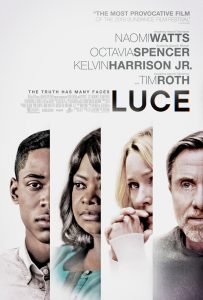
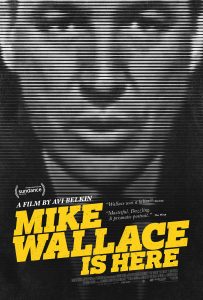


“Luce” (2019). Cast: Naomi Watts, Octavia Spencer, Tim Roth, Kelvin Harrison Jr., Norbert Leo Butz, Andrea Bang, Marsha Stephanie Blake, Omar Brunson, Noah Gaynor, Astro, Christopher Mann, Hannah Cabell. Director: Julius Onah. Screenplay: J.C. Lee and Julius Onah. Play: J.C. Lee, Luce. Web site. Trailer.
What is truth? That’s a question scholars, philosophers and theologians have wrestled with for eons. But, after all these many centuries, it still lingers, nibbled at by many deep thinkers though never satisfactorily answered. Perhaps that’s because it can’t be adequately nailed down, be it due to an undefinable or transitory nature, a plethora of conflicting opinions, or some other inscrutable quality. For what it’s worth, however, the quest continues, this time on the stage of a highly charged contemporary drama as seen in the gripping new release, “Luce.”
If ever there were a textbook example of an “honor student,” Luce Edgar (Kelvin Harrison Jr.) would be it. The Eritrean-born onetime-child soldier whose first name means “light” was adopted by his upper middle class parents, Amy (Naomi Watts), a pediatrician, and Peter (Tim Roth), a financier. With no children of their own, Amy and Peter wanted to use their considerable resources to give a fighting chance to someone who might not otherwise get one. Together they put everything they had into raising the African orphan, who has grown up to be a stellar high school senior, expert debater, star track athlete and fiercely loyal friend.
With a pedigree like that, Luce seems well on his way to a bright future, one aptly befitting of his name. But one day, quite unexpectedly, a bombshell goes off. Amy is called to Luce’s school to confer with his history teacher, Harriett Wilson (Octavia Spencer), who shares some troubling news. Miss Wilson is concerned about Luce’s work on a classroom essay assignment in which he and his fellow students were tasked with writing a paper in the first-person voice of a historic figure. For his composition, Luce chose to pen a manifesto by Frantz Fanon, a radical Black revolutionary who advocated violence as the only means to achieve political reform. The incendiary paper was filled with disturbing, inflammatory rhetoric, so much so that it shocked the project’s assignor. And, to see if there was more to this than just his provocative prose, Miss Wilson had Luce’s locker searched, an investigation that uncovered the presence of illegal fireworks, an amount capable of setting off a sizable explosion.
Needless to say, Amy can’t believe what she’s hearing. Given her son’s impeccable reputation, how could he possibly be caught up in something like this? She’s upset about the invasion of her son’s privacy, and she seriously doubts Miss Wilson’s accusations, citing the nature of the assignment to explain its content. She leaves the conference highly skeptical. However, just in case there might be something to the teacher’s claims, she decides to get to the bottom of things with her son but without directly confronting Luce with the alleged evidence. She refuses to level the same unsubstantiated charges against him without fully getting his side of the story.
[caption id="attachment_10911" align="aligncenter" width="300"] Honor student and star athlete Luce Edgar (Kelvin Harrison Jr., center) is seen as a remarkable young man by his mother, Amy (Naomi Watts, right), despite some serious skepticism by history teacher, Harriett Wilson (Octavia Spencer, left), in the taut new psychological thriller, “Luce.” Photo courtesy of Neon.[/caption]
Honor student and star athlete Luce Edgar (Kelvin Harrison Jr., center) is seen as a remarkable young man by his mother, Amy (Naomi Watts, right), despite some serious skepticism by history teacher, Harriett Wilson (Octavia Spencer, left), in the taut new psychological thriller, “Luce.” Photo courtesy of Neon.[/caption]
In questioning Luce, however, Amy finds her son to be somewhat evasive. He admits his relationship with Miss Wilson is somewhat strained, given that she often seems to have it in for him. He notes that she’s highly judgmental with limited views of what she considers acceptable behavior, particularly for minority students, such as Luce’s classmates DeShaun Meeks (Astro) and Stephanie Kim (Andrea Bang). That’s somewhat ironic, given that Miss Wilson comes from a minority background herself. This aside, though, the lack of definitive answers leaves Amy with doubts, something she didn’t expect to happen. Yet, considering her love for her son and the implicit trust she has long placed in him, she tends to give him the benefit of the doubt, even though she can’t help the onset of vacillation that seems to be creeping into her feelings.
To say more would reveal too much, but suffice it to say that matters grow progressively more complicated when a variety of other issues arise. An incident with Miss Wilson’s drug-addicted sister, Rosemary (Marsha Stephanie Blake), an internal investigation led by the school’s principal, Dan Towson (Norbert Leo Butz), a home break-in, accusations of possible sexual assault, and an incident involving the aforementioned fireworks take the situation to whole new level. And, with so much on the line, none of these events brings anyone closer to the truth – if there even is such a thing as a solitary truth.
Yet getting to the truth is what most everyone wants, no matter how elusive it might be. But, if that’s truly the case, why is it so hard to pin down? That’s because truth is often relative, based more on perceptions, perspectives and beliefs and less on objective criteria that go unquestioned. That lack of absolute certainty probably makes many of us quietly uncomfortable, but perceptions, perspectives and beliefs are by their nature variable from one person to another. And, given the role they play in the manifestation of our individual realities, their impact is formidable. In fact, they’re at the core of the conscious creation process, the philosophy that maintains these metaphysical building blocks are responsible for shaping the existence we experience.
[caption id="attachment_10912" align="aligncenter" width="300"] Proud parents Peter and Amy Edgar (Tim Roth, left, and Naomi Watts, right) wrestle with some disturbing news about their adopted honor student son in director Julius Onah’s gripping new psychological thriller, “Luce.” Photo courtesy of Neon.[/caption]
Proud parents Peter and Amy Edgar (Tim Roth, left, and Naomi Watts, right) wrestle with some disturbing news about their adopted honor student son in director Julius Onah’s gripping new psychological thriller, “Luce.” Photo courtesy of Neon.[/caption]
When those principles are applied to the scenario at work in this film, it’s easy to see how multiple versions of “the truth” emerge. The view each character holds about Luce determines how they each see him. And this doesn’t even take into account the perspective he holds about himself. What’s more, as new revelations continually arise, the sands underlying these perceptions tend to shift, making apparent that “the truth” can readily change over time with changing circumstances.
To many of us, this probably seems obvious. However, this is a reaction coming from an outside perspective. When we find ourselves embroiled in situations like the one depicted here, we may lose that objective outlook; instead, we tap into our own subjective views but somehow convince ourselves that they must be taken as gospel, intrinsically inviolable truths. Such circumstances thus demonstrate the power of beliefs and how we can imbue them with an unshakable certainty, despite the fact that they are readily alterable, even if we’d rather not see them as such. Indeed, if we draw upon these resources to create the reality we experience, they’re going to vary from individual to individual, a condition that accounts for differences in outcomes.
It’s also worth bearing in mind that things seldom arise as all or nothing scenarios. The proverbial “black and white” situations tend not to emerge as readily as we think they do; those murky in-between shades of gray are often more prevalent, and it’s those hues that we should look at most closely. Yet, for what it’s worth, that’s not the case in this story. As Luce himself pleadingly protests when the heat gets turned up, “I only get to be a saint or a monster.” Is he either of those, an upstanding citizen or a sociopath? Or is he more accurately characterized as something in between?
[caption id="attachment_10913" align="aligncenter" width="300"] Asian-American high schooler Stephanie Kim (Andrea Bang, center) is upset that her history teacher holds her to a different standard of accountability compared to non-minority students as seen in the stunning new drama, “Luce.” Photo courtesy of Neon.[/caption]
Asian-American high schooler Stephanie Kim (Andrea Bang, center) is upset that her history teacher holds her to a different standard of accountability compared to non-minority students as seen in the stunning new drama, “Luce.” Photo courtesy of Neon.[/caption]
This is an important point to bear in mind in today’s culture. Given the polarization seen in contemporary society, it might be easy to fall prey to beliefs that occupy opposite ends of the spectrum. That’s particularly true when it comes to an issue like race, a question that comes front and center in this story. Is it fair, for example, for Miss Wilson to hold minority students to a higher standard of accountability? Is she purposely being hard on them to help prepare them for the challenges they’re likely to face in an often-unfair and imperfect world? Or could it be that she’s projecting personal resentment onto them based on the experiences she underwent as she was attempting to stake her place in the world? The answers to these questions aren’t easy, but they’re almost assuredly based on the underlying beliefs on which they rest.
This riveting psychological thriller is filled with endless twists and turns that leave audiences guessing right up until the very end. What’s more important, though, is that the film forces us to face some thorny questions about race, redemption, privacy, trust, perception and prejudice, all the while showing us that things may not be as simple or clear cut as they seem. The picture’s superb script by playwright J.C. Lee and director Julius Onah, its fine film editing, and its excellent ensemble cast (most notably Spencer, Watts and Harrison) make for one of the best offerings of 2019, a release that sincerely deserves serious consideration come awards season. It already earned a Grand Jury Prize nomination in the dramatic category at the Sundance Film Festival earlier this year.
[caption id="attachment_10914" align="aligncenter" width="300"] Is he a saint or a sociopath? That’s one of many thorny questions viewers must ask themselves when it comes to high school honor student Luce Edgar (Kelvin Harrison Jr.) as seen in the gripping new drama, “Luce.” Photo courtesy of Neon.[/caption]
Is he a saint or a sociopath? That’s one of many thorny questions viewers must ask themselves when it comes to high school honor student Luce Edgar (Kelvin Harrison Jr.) as seen in the gripping new drama, “Luce.” Photo courtesy of Neon.[/caption]
No matter how earnestly we search, truth may be something that ever eludes us. The answers we come up with may be incomplete, unsatisfactory or even totally off-base. As this story illustrates, the quest may even leave us with more questions than we had at the outset of our inquiries. The important thing, though, is that we never stop searching, for we grow with each step we take along the way, and there’s no telling where that may end up taking us.
Copyright © 2019, by Brent Marchant. All rights reserved.
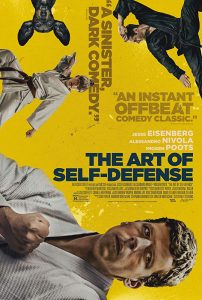
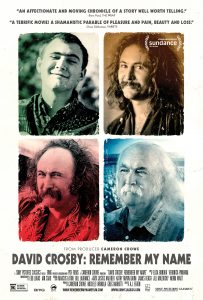


“David Crosby: Remember My Name” (2019). Cast: Interviews: David Crosby, Jan Crosby, Roger McGuinn, Cameron Crowe, Henry Diltz. Archives: Graham Nash, Stephen Stills, Neil Young, Jackson Browne, Glenn Frey, Bob Dylan, Paul McCartney, John Lennon, George Harrison, Ringo Starr, Cass Elliott, Joni Mitchell, Christine Hinton, Jimi Hendrix, Dick Cavett, Jerry Garcia, Don Everly, Phil Everly. Director: A.J. Eaton. Web site. Trailer.
It’s amazing how someone can embody both the best and worst of what we’re capable of. These qualities, polar opposites to be sure, seem incompatible with one another, yet, on occasion, they sometimes wind up residing within a single individual. Learning how to reconcile these extremes can thus prove to be quite a challenge for those of us who want to do our best but find that there are times when it’s difficult to control ourselves. Such is the experience of a legendary musician as seen in the enthralling new documentary, “David Crosby: Remember My Name.”
Singer-songwriter David Crosby has led quite a storied life. Over his decades-long career, he’s been both a golden boy and a bad boy of the music business. And now, after years of living large, partying hard and burning more than his share of bridges, he’s come into the home stretch of his life with many accolades and numerous regrets.
So how does one deal with such a curious mixture of high praise and heavy baggage? That’s what the 76-year-old musician is attempting to do these days. There’s a sense of quiet urgency associated with this, too, given Crosby’s failing health. Having experienced several heart attacks, the implantation of eight cardiac stents, a liver transplant and the onset of diabetes, he realizes he could depart this world at any time. Which is why he’s trying to make sense of his life (and himself) with what time he has left.
[caption id="attachment_10888" align="aligncenter" width="300"]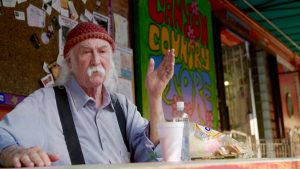 Legendary singer-songwriter David Crosby pays a visit to Laurel Canyon, his old stomping grounds and home to many up-and-coming musicians during the 1960s, as seen in the revelatory new documentary, “David Crosby: Remember My Name.” Photo by Edd Lukas and Ian Coad, courtesy of Sony Pictures Classics.[/caption]
Legendary singer-songwriter David Crosby pays a visit to Laurel Canyon, his old stomping grounds and home to many up-and-coming musicians during the 1960s, as seen in the revelatory new documentary, “David Crosby: Remember My Name.” Photo by Edd Lukas and Ian Coad, courtesy of Sony Pictures Classics.[/caption]
“David Crosby: Remember My Name” is more than just a nostalgic stroll down memory lane. To be sure, the film does cover the many diverse aspects of his career, including his often-stormy stint with the 1960s rock band the Byrds, his phenomenally successful collaborations with Stephen Stills, Graham Nash and Neil Young, and his legendary appearance at the Woodstock Music Festival. It also explores his professional and personal relationships with other high-profile musicians of the ʼ60s and ʼ70s, such as Jerry Garcia, Bob Dylan, Joni Mitchell, Cass Elliott and Jimi Hendrix. And it looks at his many romances, including those with Mitchell, with longtime girlfriend Christine Hinton (who was tragically killed in a traffic accident) and with his current wife, Jan.
But, despite his many successes, Crosby has also had his share of downfalls. In addition to his health problems and his long-lasting despair over Christine’s death, he has undergone serious bouts of addiction and prison time. He got himself fired from the Byrds for his unpredictable, unreliable and irresponsible antics, a number of them occurring while on stage and involving highly inflammatory political messages at the height of the social turbulence of the 1960s. And then there were his very public disputes with former collaborators like Byrds founder Roger McGuinn and all of his CSNY bandmates.
But, then again, Crosby has achieved accomplishments few others have attained. He’s been inducted into the Rock ʼn Roll Hall of Fame twice, first as a member of the Byrds in 1991 and then as a member of Crosby, Stills and Nash in 1997. And then, at age 72, when many of us begin kicking back and settling down, he launched head first into a prolific creative resurgence, producing four solo albums over four years, with more apparently to come.
[caption id="attachment_10889" align="aligncenter" width="300"] Guitarist David Crosby rocks out during a concert featuring Crosby, Stills, Nash and Young (CSNY) as seen in director A.J. Eaton’s new documentary, “David Crosby: Remember My Name.” Photo by Neal Preston, courtesy of Sony Pictures Classics.[/caption]
Guitarist David Crosby rocks out during a concert featuring Crosby, Stills, Nash and Young (CSNY) as seen in director A.J. Eaton’s new documentary, “David Crosby: Remember My Name.” Photo by Neal Preston, courtesy of Sony Pictures Classics.[/caption]
To many of us, such extreme contrasts probably seem incongruous. By Crosby’s own admission, they even seem that way to him. He’s not even sure how he’s managed to live as long as he has, given the passings of so many of his contemporaries, including some who lived less recklessly than he has. However, he’s made every attempt to be honest with himself about his behavior, acknowledging his shortcomings and realizing that his failings are of his own making and no one else. While he hopes that reconciliations with his former collaborators might be possible – an accomplishment he’s been able to achieve with most of his family members – he’s also cognizant enough to realize that such reunions are unlikely and that he’s the cause for that. In light of that, he accepts his feelings and responsibilities, hoping for redemption but nevertheless moving on, continuing to concentrate on what he does best – making music.
For better or worse, creative expression is something that often requires acquiring a range of experiences, both positive and negative. Were it not for that, artists might well not be able to produce their best work. While that certainly involves the heights of elation, it may also call for firsthand knowledge of painful despair, something most of us would rather eschew but that may be unavoidably integral to the successful unleashing of our inner muse.
That may help to account for Crosby’s experience. For what it’s worth, having gone through such ups and downs could help to explain his creative success, experiences made possible by the conscious creation process, the philosophy that maintains we manifest the reality we experience through the power of our thoughts, beliefs and intents. Although he lived through the free-thinking times of the 1960s counterculture, an era in which such alternative notions emerged from obscurity and gained a firm foothold in the culture, it’s unclear whether he became aware of or availed himself of this philosophical outlook. But, even if not, much of his life experience reflects many of the principles underlying this metaphysical mindset.
[caption id="attachment_10890" align="aligncenter" width="300"] Musician David Crosby (center) performs with longtime collaborators Stephen Stills (left) and Graham Nash (right) in the new documentary, “David Crosby: Remember My Name.” Photo by Henry Diltz, courtesy of Sony Pictures Classics.[/caption]
Musician David Crosby (center) performs with longtime collaborators Stephen Stills (left) and Graham Nash (right) in the new documentary, “David Crosby: Remember My Name.” Photo by Henry Diltz, courtesy of Sony Pictures Classics.[/caption]
When looking at Crosby’s creative output in conjunction with the events of his life, one can see parallels between his personal experience and his artistic expressions. The “inspiration” provided by such incidents helped make that possible, both positively and negatively and in both his individual and collaborative efforts. Would that have happened if he had not drawn those experiences into his existence? That’s hard to say with certainty, but we have seen it with an array of other artists (including in a number of recent films) involving everyone from painters to musicians to actors. By having something to draw upon, these creatives have tapped into source material that helped them manifest their works, developments that might not have otherwise happened.
That’s important, too, for it’s crucial to one’s value fulfillment, the conscious creation principle that maintains we should strive to become our best, truest selves for the betterment of ourselves and those around us. Music has been Crosby’s destiny ever since he learned to sing and play the guitar, and, fortunately for him (and us), he was perceptive enough to recognize this ability and to make the most of it. His inventive melodies, blissful harmonies and thoughtful lyrics have given us much to savor, creations that have truly made the world a better place for him having been a part of it. One need only look, for example, at his involvement with the stirring protest song “Ohio,” a composition written by CSNY collaborator Neil Young in response to the 1970 Kent State University shootings, to see the impact his contributions have made on the national culture and psyche. His art helped unite us at a time when we needed it, leaving a legacy that has lasted ever since.
With that kind of impact, it’s easy to see how one’s influence on the culture can extend far and wide. The often-outspoken Crosby, for instance, helped shape the social and cultural landscape of the 1960s. He even unwittingly left an imprint on the art and politics of the time, as seen in a post-Woodstock appearance on The Dick Cavett Show in which he made his views as plain as day, helping bring radical new ideas to the mainstream. He even had impact on fashion and style, as evidenced by the looks, mannerisms and attitudes exhibited by the character played by Dennis Hopper in the radical cinematic epic “Easy Rider” (1969). When one can wield that kind of wide-ranging influence, it’s possible to reshape the world, even in matters of critical importance and individual style.
[caption id="attachment_10891" align="aligncenter" width="300"] On stage at the peak of their career (from left) Neil Young, Graham Nash, David Crosby and Stephen Stills (CSNY) appear before a packed stadium audience as seen in the candid new documentary, “David Crosby: Remember My Name.” Photo by Joel Bernstein, courtesy of Sony Pictures Classics.[/caption]
On stage at the peak of their career (from left) Neil Young, Graham Nash, David Crosby and Stephen Stills (CSNY) appear before a packed stadium audience as seen in the candid new documentary, “David Crosby: Remember My Name.” Photo by Joel Bernstein, courtesy of Sony Pictures Classics.[/caption]
Crosby didn’t remain static throughout all this, either. He constantly evolved and changed, an expression of the conscious creation concept that we’re all in a constant state of becoming. This is reflected in his diverse musical repertoire, as well as his other artistic ventures, including occasional forays into acting and “modeling” for rock photographer Henry Diltz. It’s also apparent in the various roles he’s played in his vocation, having been everything from a peer collaborator to a solo act to a mentor for a new generation of musicians. That’s quite a range for multiple lifetimes, let alone one.
Given where Crosby is now, however, he’s most focused on certain goals, using his creative powers to fulfill as many of them as he can with the time he has left. Most of them center on the concept of redemption, both personally and artistically. It’s commendable that he recognizes this, too, for it’s a healthy approach to try to rectify our missteps. All too often we feel reconciled to our failures, convinced we’ll never be able to redeem ourselves. But, as the saying goes, nobody’s perfect, and we all make mistakes in the course of our individual journeys.
Oftentimes these missteps involve valuable life lessons that don’t always go perfectly on our initial attempts. But we don’t get only one attempt; we can always start anew if we allow ourselves to do so. Conscious creation makes it possible to try again, invoking different beliefs and trying different approaches, new and improved initiatives that, one can hope, will work. That certainly seems to be what Crosby is doing now. Let’s wish him the best.
[caption id="attachment_10892" align="aligncenter" width="300"]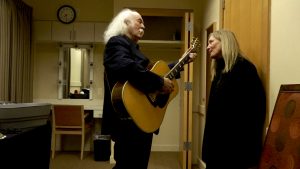 With wife Jan (right), guitarist David Crosby (left) shares a private moment in the new documentary, “David Crosby: Remember My Name.” Photo by Edd Lukas and Ian Coad , courtesy of Sony Pictures Classics.[/caption]
With wife Jan (right), guitarist David Crosby (left) shares a private moment in the new documentary, “David Crosby: Remember My Name.” Photo by Edd Lukas and Ian Coad , courtesy of Sony Pictures Classics.[/caption]
Hands down, this is one of the best music/celebrity biographical documentaries I have ever seen. In many ways it’s a personal confession, providing an unflinchingly candid look at someone who wants to bare his soul, make reparations for whatever he can and leave the world with as much of his gift as he’s able to create. Through uncensored interviews with the artist and those who know him, as well as a wealth of archive photos and footage, viewers are treated to an honest, introspective look at one of the most influential musicians of the ʼ60s and ʼ70s. Director A.J. Eaton and executive producer Cameron Crowe have put together one helluva picture here, a Grand Jury Prize nominee in the documentary category at the Sundance Film Festival. Don’t miss this one.
Time passes us by quickly with no regard for how we feel about that. As a consequence, it’s up to each of us to manage this resource as best we can, making the most of it and certainly not squandering it. But, should we screw up, all is not lost; we always have a chance to make up for our errors, even when the clock is running out. The key, though, is taking charge of our efforts and invoking beliefs that will bring about what we hope to achieve while we have time left. David Crosby provides us with an excellent example of how to go about this, showing that it’s never too late to make amends – or a little music.
Copyright © 2019, by Brent Marchant. All rights reserved.
“The Art of Self-Defense” (2019). Cast: Jesse Eisenberg, Alessandro Nivola, Imogen Poots, Steve Terada, Phillip Andre Botello, David Zellner, Hauke Bahr, Davey Johnson, Nicholas Hulstine, Scott Goodman, Justin Eaton. Director: Riley Stearns. Screenplay: Riley Stearns. Web site. Trailer.
Crossing the line from passion to obsession is a dangerous step. One need only look at the many high-profile examples found in our world these days. But this phenomenon is by no means limited to the events we see on the nightly news; it can crop up anywhere, even in seemingly innocuous places, a troubling subject explored in the edgy new dark comedy, “The Art of Self-Defense.”
Thirty-something office worker Casey Davies (Jesse Eisenberg) could seriously stand to grow a pair. The easily bullied milquetoast cowers in fear about nearly everything, but, considering how often and how readily he’s picked on – by virtually everyone he encounters, from co-workers to coffee house patrons to strangers in parking lots – his reaction is understandable. And what’s worse is that he keeps taking it. But that all changes one night; while walking home after running out to buy dog food for his pet dachshund, he’s mugged by a renegade motorcycle gang, leaving him seriously injured.
[caption id="attachment_10880" align="aligncenter" width="300"] Frequently bullied office worker Casey Davies (Jesse Eisenberg, foreground) decides to learn how to protect himself by enrolling in karate school, a move that gets him more than he bargained for, as seen in the new dark comedy, “The Art of Self-Defense.” Photo courtesy of Bleecker Street.[/caption]
Frequently bullied office worker Casey Davies (Jesse Eisenberg, foreground) decides to learn how to protect himself by enrolling in karate school, a move that gets him more than he bargained for, as seen in the new dark comedy, “The Art of Self-Defense.” Photo courtesy of Bleecker Street.[/caption]
While recuperating, Casey decides he needs to do something to protect himself. He opts to buy a handgun, but, as he fills out the background check paperwork, he begins having reservations. He leaves the store ambivalent about the idea and goes for a walk, stumbling upon a karate studio. He enters and watches a class in session – and is instantly captivated.
When class is over, Casey approaches the dojo’s ultra-cool Sensei (Alessandro Nivola), expressing a keen interest in learning the ancient art. He professes that he wants to become one of the people who routinely taunt him, a revelation that prompts the Sensei to assertively court the wannabe student. Casey eagerly agrees to enroll, but with no idea of what he’s about to get himself into.
To say more would reveal too much, but suffice it to say that Casey is steadily overwhelmed by his circumstances. While he appears to have quite a knack for karate – a proficiency that empowers the new student and impresses the Sensei – he soon finds himself embroiled in a dark and sinister situation. The uber-masculine, quasi-misogynistic, testosterone-dripping Sensei carries his attitude, practices and instruction more than a little too far, leading the gullible, impressionable Casey down some very questionable paths involving his personal behavior, his professional life and his home life. A macabre and tangled web of deception gradually emerges involving an off-limits equipment room, a female brown belt instructor regularly passed over for advancement to black belt (Imogen Poots) and the aforementioned motorcycle gang. And, as the story unfolds, Casey has a lot more to worry about than just protecting himself from being bullied.
[caption id="attachment_10881" align="aligncenter" width="300"]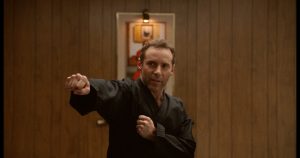 The enigmatic Sensei (Alessandro Nivola) of a karate studio practices more than a few unconventional tactics in the offbeat new dark comedy, “The Art of Self-Defense.” Photo courtesy of Bleecker Street.[/caption]
The enigmatic Sensei (Alessandro Nivola) of a karate studio practices more than a few unconventional tactics in the offbeat new dark comedy, “The Art of Self-Defense.” Photo courtesy of Bleecker Street.[/caption]
Most of us would agree that there’s nothing wrong with being passionate about something, be it a hobby, a sport or some other innocent endeavor. But, when we carry things too far, when we venture into the realm of fanaticism, we could face a number of problems, some potentially serious. That can be compounded, too, if we drag others along with us, spreading the possibility of pain and anguish to unwitting accomplices.
But how do such matters get out of hand? In essence, it comes down to how we view these undertakings and what we come to believe about them. There can be a fine distinction between diversion and obsession. But, in both cases, they’re fueled by the power of the beliefs that underlie them. And that is what ultimately makes things materialize as they do, a consequence of the conscious creation process, the philosophy that maintains we manifest the reality we experience through the power of our thoughts, beliefs and intents.
In a situation like the one portrayed here, one might wonder how a fervent but benign interest in martial arts can transform into something much more menacing. To understand this, we need to look not only at the beliefs driving the interest in karate, but also any associated beliefs related to it – its defining characteristics, its intended purpose, how and why we put it to use, and so forth, the particular traits that come to distinguish how each of us practices the sport and for what reasons. On the surface, it all may just look like karate, but, upon closer examination, we might see one person practicing a competitive activity while someone else is engaged in something clandestine with a frightening agenda. And, when scenarios like the latter one take root, we run the risk of fanaticism taking over.
[caption id="attachment_10882" align="aligncenter" width="300"]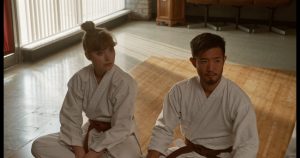 Brown belt karate instructor Anna (Imogen Poots, left) regularly gets passed over for elevation to black belt status, a source of frustration for the accomplished practitioner, as seen in the absurdist dark comedy, “The Art of Self-Defense.” Photo courtesy of Bleecker Street.[/caption]
Brown belt karate instructor Anna (Imogen Poots, left) regularly gets passed over for elevation to black belt status, a source of frustration for the accomplished practitioner, as seen in the absurdist dark comedy, “The Art of Self-Defense.” Photo courtesy of Bleecker Street.[/caption]
As this story plays out, viewers witness the Sensei’s true nature emerge. It becomes apparent that he’s not teaching a noble martial art but, rather, preaching a gospel of intimidating hyper-masculinity, modestly tinged with veiled homoeroticism and an undeniable hostility toward weakness or anything feminine. These ancillary aspects of his own particular brand of instruction are far from the traditional teachings of the ancient masters, yet there they are, firmly rooted in his class sessions, fanatical lessons that he seeks to pass along to his students.
This naturally begs the question, “Why?” In the conscious creation treatise The Individual and the Nature of Mass Events, author Jane Roberts explains that fanaticism often arises from experiences in which an individual believes in a need to make a point while simultaneously attempting to make up for personal failings, frequently by overcompensating in the process. When applying that principle to the Sensei’s efforts at extolling his macho, chauvinistic dogma, it’s not too hard to figure out where the “inspiration” for his current actions may have come from. And the fact that his teachings focus more on punishing one’s enemies rather than practicing self-defense speaks volumes. Whatever experiences he may have had that prompted these beliefs, they were obviously significant enough to establish intents that have become firmly entrenched and are now freely materializing, questionable though they may be.
Given Casey’s personal experiences, it’s not too difficult to imagine how he might be intrigued by the Sensei’s charisma. In many ways, the Sensei is who Casey wants to be – at least initially. However, when he begins to see the Sensei for who he really is, he realizes that he may be dealing with yet another bully, especially as the nefarious nature of his schemes is revealed. How Casey responds to this scenario is his new challenge, and that response will depend on his beliefs. Can he succeed at becoming who he claims he wants to be?
[caption id="attachment_10883" align="aligncenter" width="300"]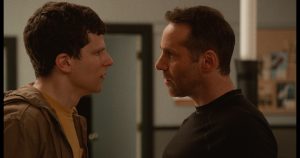 As the relationship between karate student Casey Davies (Jesse Eisenberg, left) and his Sensei (Alessandro Nivola, right) becomes strained, the tension between them grows significantly as seen in “The Art of Self-Defense.” Photo courtesy of Bleecker Street.[/caption]
As the relationship between karate student Casey Davies (Jesse Eisenberg, left) and his Sensei (Alessandro Nivola, right) becomes strained, the tension between them grows significantly as seen in “The Art of Self-Defense.” Photo courtesy of Bleecker Street.[/caption]
Interestingly, while the film focuses on the relationship of the two principals, in many regards the story is a microcosmic metaphor for the wider world. Given the current sociopolitical situation of the nation (some might say the entire world), many of us are being intimidated, or even attacked, by a plethora of bullies. Those doling out the threats and injuries are not unlike the Sensei, a chilling symbol representative of the individuals and institutions who are trying to put us under their thumbs. Will we succumb to the pressure? Or do we believe in ourselves enough to rise to the occasion, even if it means having to take on those who falsely claim they want to help us? That’s a tall order, for sure, but, as Casey discovers for himself, that may be just what we need to do, too. Ironically, he may end up being an unlikely role model not only for himself, but also for the rest of us.
Of course, everything depends on whether we believe we can accomplish our aspirations. That goes for Casey, as well as the rest of us. If we look deeply enough, though, there’s a good chance we’ll find the inner strength and fortitude needed to realize those goals – provided we give them a chance to reveal themselves. Along the way, though, we must also heed the message of this cautionary tale and keep ourselves from employing the same kinds of tactics in taking on the fanaticism that confronts us.
This rivetingly funny but edgy dark comedy, reminiscent of “Fight Club” (1999), is certain to make viewers both laugh – and squirm – in their seats. Eisenberg and Nivola are perfect foils for one another, each turning in fine performances in which they serve up ample helpings of neuroticism and creepiness in their respective roles, an intriguing combination that never disappoints. The picture’s extensive use of deadpan humor evokes frequent unexpected laughs, getting plenty of mileage out of intrinsically absurd situations and not having to rely on one-liners alone. The film admittedly has a few plot holes and requires leaps in believability along the way, but they also add to the somewhat surreal quality of this satire, which doubles as both an intriguing story of its own and a less-than-veiled social-political commentary. Director Riley Stearns’s second feature offering is definitely one of the funniest, strangest and most decidedly twisted offerings of the year.
No one likes bullies, but, in facing them down, we must be careful not to inadvertently become who we oppose. This calls upon us to take a good, hard look at the beliefs – all of them – that play a role in a venture like this. We don’t want to fall prey to that which we detest. That calls for us to get creative in our approaches to addressing these matters, using whatever we have at our disposal, including in unheard-of ways, forms of self-defense that truly are an art.
Copyright © 2019, by Brent Marchant. All rights reserved.
